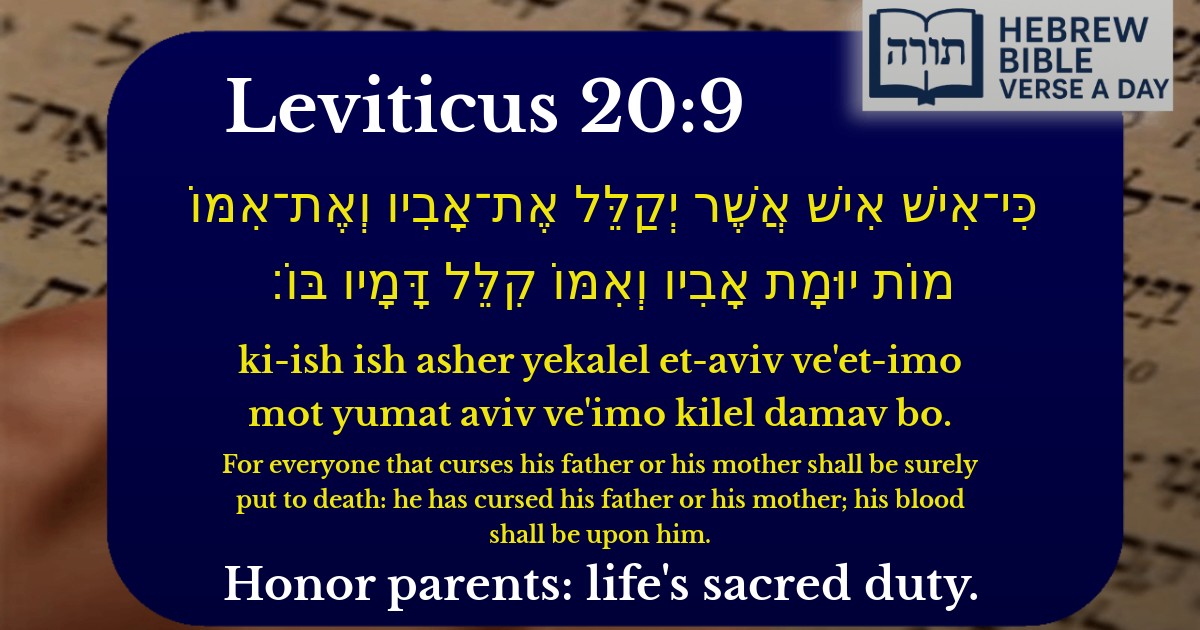Join Our Newsletter To Be Informed When New Videos Are Posted
Join the thousands of fellow Studends who rely on our videos to learn how to read the bible in Hebrew for free!
Hebrew Text
כִּי־אִישׁ אִישׁ אֲשֶׁר יְקַלֵּל אֶת־אָבִיו וְאֶת־אִמּוֹ מוֹת יוּמָת אָבִיו וְאִמּוֹ קִלֵּל דָּמָיו בּוֹ׃
English Translation
For everyone that curses his father or his mother shall be surely put to death: he has cursed his father or his mother; his blood shall be upon him.
Transliteration
Ki-ish ish asher yekalel et-aviv ve'et-imo mot yumat aviv ve'imo kilel damav bo.
Hebrew Leining Text
כִּֽי־אִ֣ישׁ אִ֗ישׁ אֲשֶׁ֨ר יְקַלֵּ֧ל אֶת־אָבִ֛יו וְאֶת־אִמּ֖וֹ מ֣וֹת יוּמָ֑ת אָבִ֧יו וְאִמּ֛וֹ קִלֵּ֖ל דָּמָ֥יו בּֽוֹ׃
כִּֽי־אִ֣ישׁ אִ֗ישׁ אֲשֶׁ֨ר יְקַלֵּ֧ל אֶת־אָבִ֛יו וְאֶת־אִמּ֖וֹ מ֣וֹת יוּמָ֑ת אָבִ֧יו וְאִמּ֛וֹ קִלֵּ֖ל דָּמָ֥יו בּֽוֹ׃
🎵 Listen to leining
Parasha Commentary
📚 Talmud Citations
This verse is quoted in the Talmud.
📖 Sanhedrin 66a
The verse is discussed in the context of the laws regarding cursing one's parents, emphasizing the severity of the transgression and its capital punishment.
📖 Makkot 4b
The verse is referenced in a discussion about the types of sins that warrant capital punishment, including cursing one's parents.


Severity of Cursing Parents
The verse (Vayikra 20:9) establishes a severe punishment for one who curses their father or mother, stating they shall be put to death. This underscores the gravity of dishonoring parents in Jewish law. Rashi explains that the phrase "מוות יומת" ("shall surely be put to death") implies execution by stoning (סקילה), as derived from the Talmud (Sanhedrin 66a). The repetition of "אביו ואמו קלל" ("he has cursed his father or his mother") emphasizes that the transgression applies equally to both parents.
Legal and Moral Implications
Rambam (Hilchos Mamrim 5:1-2) elaborates that this prohibition applies whether the parent is alive or deceased, and includes any derogatory or disrespectful language. The Talmud (Sanhedrin 85b) further clarifies that the death penalty applies only if the curse includes an explicit mention of G-d's name (e.g., "May G-d strike my father"), as this constitutes a form of blasphemy. Lesser curses, while still forbidden, do not incur capital punishment.
Spiritual Consequences
The phrase "דמיו בו" ("his blood shall be upon him") signifies that the transgressor bears full responsibility for their fate. The Midrash (Sifra Kedoshim 9:3) teaches that such an act severs one's connection to both family and divine covenant, as honoring parents reflects reverence for Hashem, their Creator. The severity of the punishment highlights the foundational role of kibbud av va'em (honoring parents) in maintaining moral and societal order.
Comparative Analysis with Other Laws